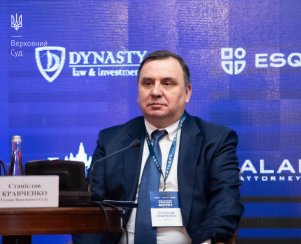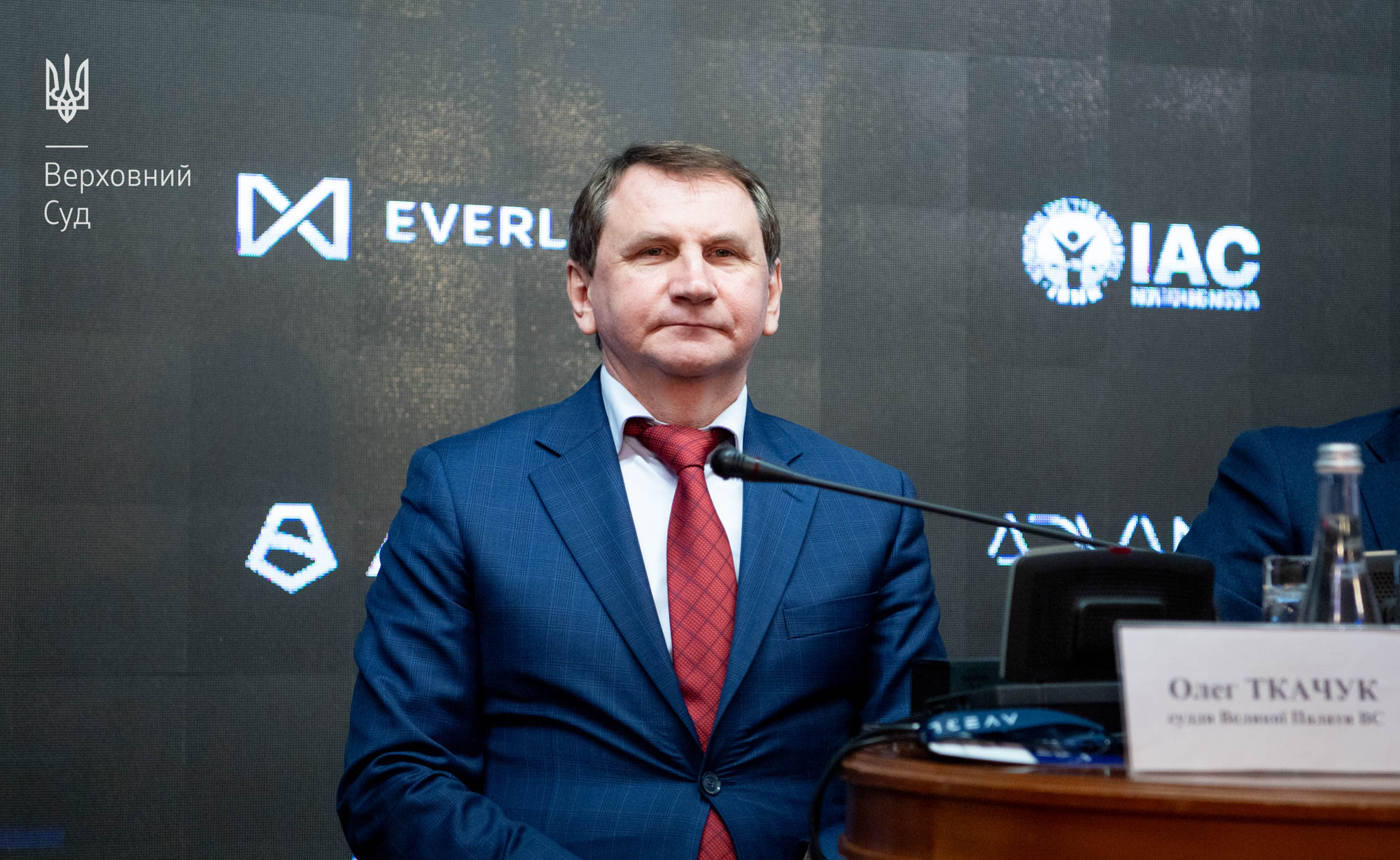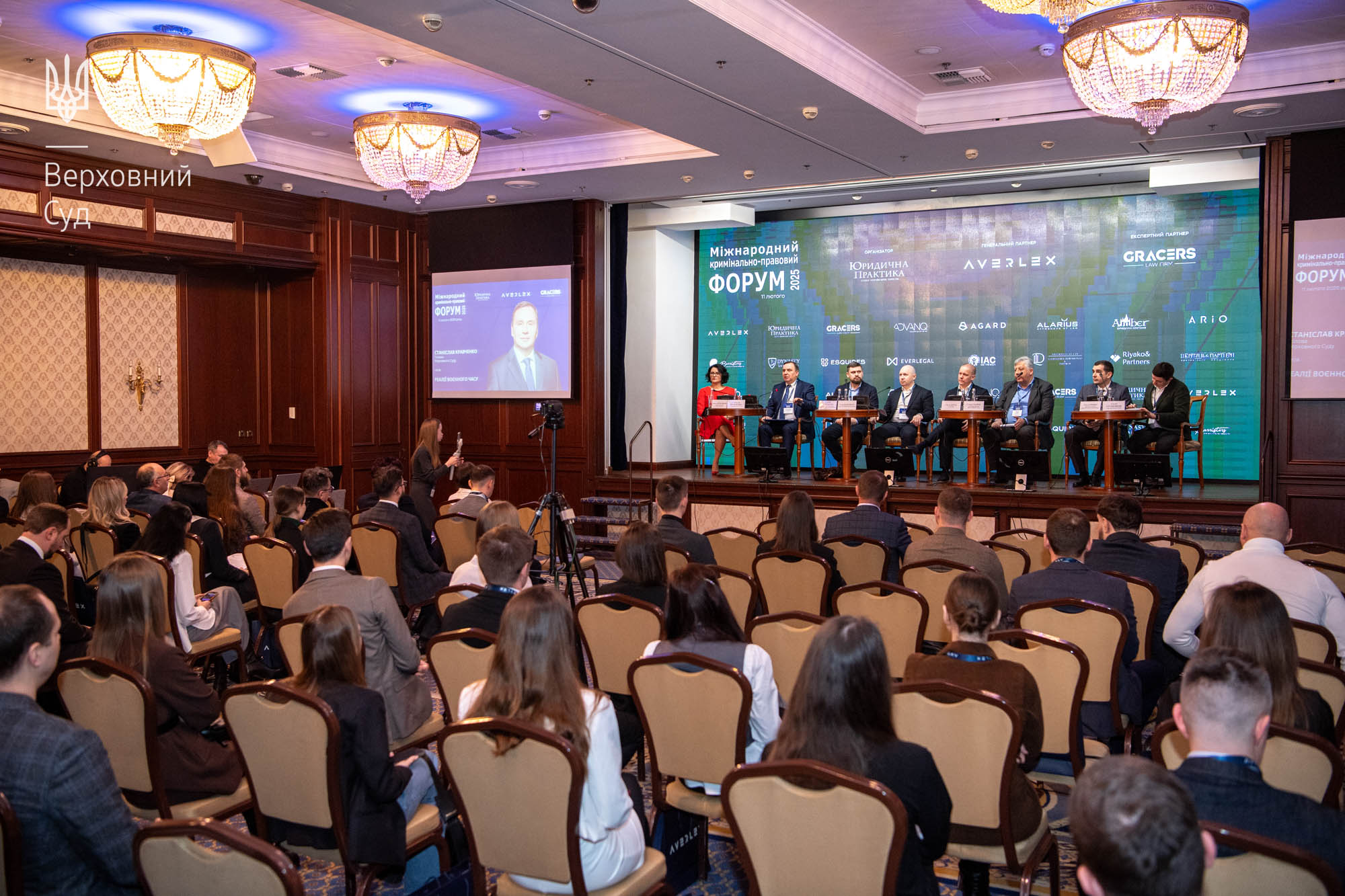Contact center of the Ukrainian Judiciary 044 207-35-46

In the context of the war, criminal proceedings, in particular, on crimes against the foundations of national security, war crimes and military crimes, have become particularly important, and the Supreme Court has managed to quickly identify and resolve urgent problems that arose in the process of considering the relevant categories of cases.
This was stated by Stanislav Kravchenko, President of the Supreme Court, during the VII International Criminal Law Forum organised by the Yurydychna Praktyka Publishing House.
At the same time, according to the SC President, the work of the Supreme Court is largely focused on the development of international law. This is exemplified, first of all, by the legal position of the Grand Chamber of the Supreme Court, formulated in the decision of 28 February 2024 in case No. 415/2182/20, on determining the characteristics of the subject of a crime under Article 437 of the Criminal Code of Ukraine.
This decision was well received by the international community and its importance for the national legal system cannot be overestimated, since prior to its adoption there were two conflicting approaches to determining the circle of persons who could be the subject of the said crime.
In addition, Stanislav Kravchenko, analysing the main legal conclusions formulated by the Supreme Court in criminal cases in the past year, drew attention to the decision of the Joint Chamber of the Criminal Cassation Court of the Supreme Court of 15 January 2024 in case No. 722/594/22 on the correct qualification of acts punishable under Part 4 of Art. 185 of the Criminal Code of Ukraine on the qualifying ground of committing a crime "under martial law".
The decision of the SC CrimCC JC states that, taking into account the amendments introduced by the Law of Ukraine No. 2117-IX, the provision of the Law of Ukraine on criminal liability under Part 4 of Article 185 of the Criminal Code of Ukraine is applicable in the case of "committing a criminal offence under martial law or a state of emergency". Instead, "committing a crime using the conditions of martial law" (clause 11, part 1, Article 67 of the Criminal Code of Ukraine) as an aggravating circumstance may be taken into account by the court only in the aspect of individualisation of criminal liability.
Stanislav Kravchenko also cited the legal opinion of the SC CrimCC JC of 7 October 2024 in case No. 278/1566/21 on the decriminalisation of stealing another's property by theft (Article 185 of the Criminal Code of Ukraine).
Thus, the SC CrimCC JC concluded that the Law of Ukraine "On Amendments to the Code of Ukraine on Administrative Offences and Some Other Laws of Ukraine on Strengthening Liability for Petty Theft of Other People's Property and Regulation of Some Other Issues of Law Enforcement", which amended Art. 51 of the Code of Ukraine on Administrative Offences, is a law on criminal liability that cancels criminal unlawfulness within the meaning of Art. 5 of the Criminal Code of Ukraine for those acts that were considered a criminal offence before the entry into force of this Law, but after it entered into force fall under the signs of an administrative offence under Art. 51 of the Code of Ukraine on Administrative Offences. The amendments introduced by the Law have retroactive effect. At the same time, in the process of determining whether the value of the stolen goods exceeds the amount specified in Article 51 of the Code of Ukraine on Administrative Offences, the amount of the tax-free minimum income of citizens established at the time of the offence should be taken into account, considering the relevant provisions of the Tax Code of Ukraine.
In addition, the President of the Supreme Court highlighted the legal conclusion set out in the decision of the SC CrimCC JC of 7 October 2024 in case No. 466/525/22 regarding the urgency of conducting a search of a home without a decision of the investigating judge.
In this decision, the Joint Chamber emphasised that investigators, pre-trial inquiry officers, and prosecutors have the right to enter a person's home or other property in urgent cases, in particular to save material objects (property) that may potentially be material evidence in criminal proceedings from foreseeable destruction or loss, before the investigating judge issues a ruling.
In connection with Part 3 of Article 233 of the Criminal Procedure Code of Ukraine, the urgency of such a case is demonstrated by data on the real threat of destruction or loss of property. In the application for a search warrant in the materials submitted in support thereof, and in the decision of the investigating judge issued after the fact, it shall be stated what circumstances at the time of the intrusion indicated that the delay could lead to the destruction of material evidence, that the information on the threat of its destruction or loss gave grounds to consider it as real.
In conclusion, Stanislav Kravchenko emphasised that the Supreme Court is aware of its key role in ensuring and shaping a unified and sustainable case law and will continue to pursue this important mission.
Oleh Tkachuk, judge of the Grand Chamber of the Supreme Court, noted that in 2024, Ukrainian courts considered almost 4.4 million cases. A significant number of them concern servicemen, persons liable for military service and veterans of the Russian-Ukrainian war, including persons with disabilities.

Over the past two years, more than 200,000 servicemen and women have been brought to administrative responsibility. During the full-scale war, about 100,000 criminal proceedings have been opened for committing military crimes, of which 20,000 servicemen have already been held criminally liable. In addition, more than 140,000 war crimes committed by the Russian military in Ukraine have been registered.
At the same time, the majority of court cases in the military sphere are not about punishment, but about protecting the rights of military personnel and veterans. These are tens of thousands of cases related to mobilisation, the activities of military authorities, violations of the rights of servicemen, and the legal and social protection of veterans and their families.
Society wants justice for those who defend the country. That is why there is an ongoing discussion in Ukraine about the feasibility of restoring military courts. After all, hundreds of thousands of people are involved in the defence of the state, and this specific category of cases requires special knowledge of military law, as well as experience of living and working in a military organisation.
Oleh Tkachuk believes that a specialised state structure should be established to correctly interpret the legal norms in force in the Armed Forces of Ukraine, determine the criteria for liability and ensure social protection for millions of servicemen. This should be a system of military justice bodies that, in accordance with the Constitution of Ukraine (Article 55), will protect human and civil rights and freedoms, i.e. military courts.
The experience of history and NATO countries confirms that the three tiers of military courts (several district military courts, the Military Court of Appeal and the Military Chamber of the Supreme Court) can be organically integrated into the system of general courts in Ukraine.
Military courts are able to ensure proper judicial control over the activities of military command and control bodies, law enforcement agencies on the contact line, in combat situations and the observance of the appropriate level of secrecy and military secrets.
Although the national judicial system copes with the resolution of cases in the military sphere, ensuring a fair approach to each serviceman, the quality of consideration of military court cases may subsequently suffer under the conditions of a huge judicial workload on existing judges, as these cases often involve complex issues of military law, statutory duties, combat conditions and moral and psychological challenges inherent in martial law and hostilities. Courts of general jurisdiction, lacking sufficient time to study the peculiarities of military legal relations, relevant experience or knowledge of such peculiarities, may misinterpret these aspects, with consequences for the people and the combat capability of the State.
"When deciding on the re-establishment of military courts in Ukraine, it should be taken into account that such courts can be formed, in particular, from those judges who are already serving in combat units. Military courts, together with other law enforcement agencies, are able to ensure justice and law and order in the Armed Forces of Ukraine and proper legal and social protection of servicemen," the judge of the Grand Chamber of the Supreme Court noted.
